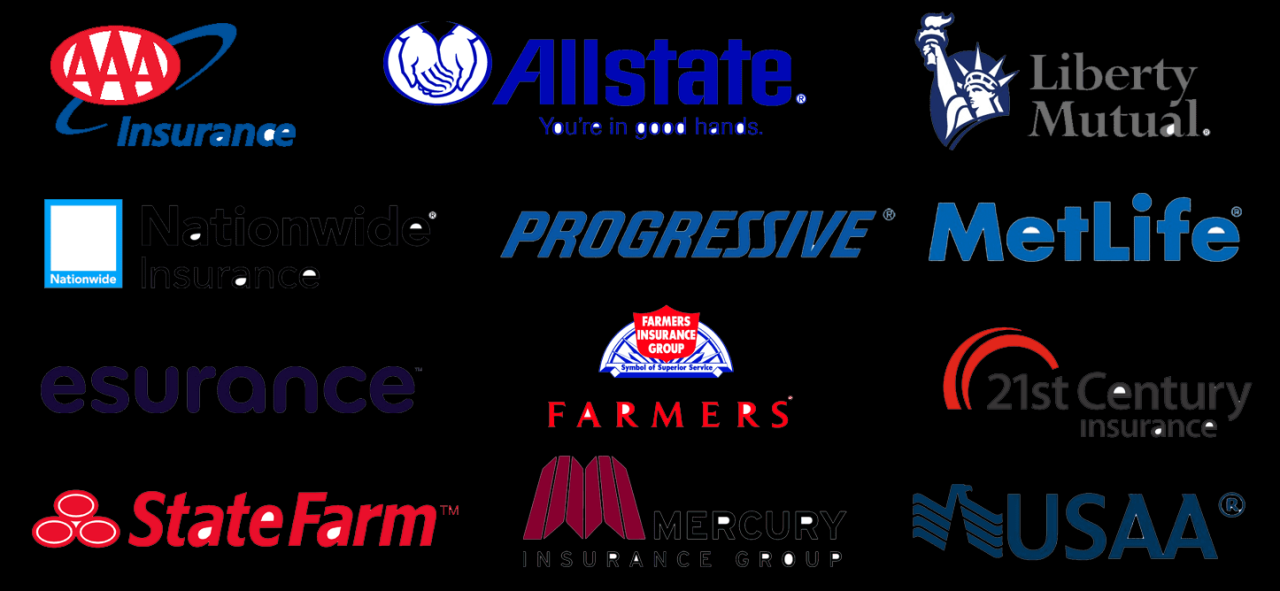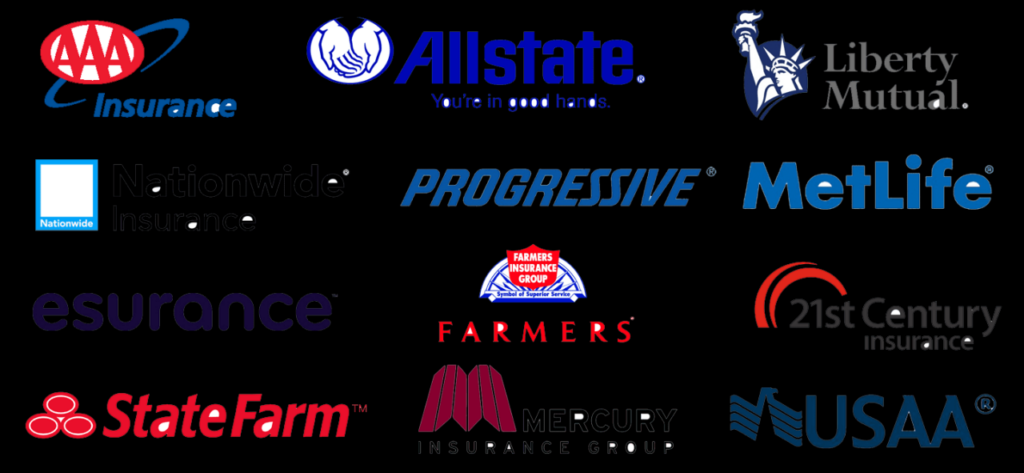Good car insurance companies are essential for protecting yourself financially in case of an accident or other unforeseen events. Finding the right company can be a daunting task, as there are numerous options available, each with its own strengths and weaknesses. Understanding your needs, comparing quotes, and considering factors like customer service, claims handling, and financial stability are crucial steps in choosing the best car insurance company for you.
This guide will provide a comprehensive overview of the car insurance landscape, helping you navigate the process of finding the right coverage and securing the best rates. From understanding the different types of coverage to comparing quotes and exploring tips for saving money, we’ll cover all the essential aspects of car insurance.
Understanding Car Insurance Basics

Car insurance is essential for protecting yourself financially in the event of an accident or other unforeseen circumstances involving your vehicle. It provides financial coverage for damages, injuries, and other liabilities. Understanding the different types of coverage and how they work is crucial for making informed decisions about your insurance policy.
Types of Car Insurance Coverage
Car insurance policies typically include several types of coverage, each designed to address specific situations.
- Liability Coverage: This is the most basic type of car insurance, and it’s usually required by law. Liability coverage protects you financially if you’re at fault in an accident that causes damage to another person’s property or injuries to another person. It covers the other driver’s medical expenses, lost wages, and property damage up to the limits of your policy.
- Collision Coverage: This coverage pays for repairs or replacement of your vehicle if it’s damaged in a collision with another vehicle or object, regardless of who is at fault. Collision coverage typically has a deductible, which is the amount you pay out of pocket before your insurance company covers the rest of the repair costs.
- Comprehensive Coverage: This coverage protects your vehicle from damages caused by events other than collisions, such as theft, vandalism, fire, hail, or natural disasters. Like collision coverage, comprehensive coverage usually has a deductible.
- Uninsured/Underinsured Motorist Coverage: This coverage protects you if you’re involved in an accident with a driver who doesn’t have insurance or doesn’t have enough insurance to cover your damages. It can help pay for your medical expenses, lost wages, and property damage.
- Personal Injury Protection (PIP): This coverage pays for your medical expenses and lost wages if you’re injured in an accident, regardless of who is at fault. PIP is often required in certain states.
Factors Influencing Car Insurance Premiums
Several factors can influence the cost of your car insurance premiums.
- Age and Driving Experience: Younger drivers with less experience are statistically more likely to be involved in accidents, so they typically pay higher premiums. As you gain more experience and age, your premiums generally decrease.
- Driving History: Your driving record plays a significant role in determining your premium. Drivers with a history of accidents, traffic violations, or DUI convictions will usually pay higher premiums. Maintaining a clean driving record can help you get lower rates.
- Vehicle Type: The type of vehicle you drive affects your premium. Cars with high performance, luxury, or expensive repair costs are generally associated with higher insurance premiums. Older vehicles with lower replacement costs tend to have lower premiums.
- Location: Where you live can impact your insurance rates. Areas with higher crime rates, traffic congestion, or a greater number of accidents often have higher insurance premiums.
- Credit Score: In some states, insurance companies use your credit score as a factor in determining your premium. This is based on the idea that people with good credit are more likely to be responsible drivers.
Deductibles
A deductible is the amount of money you pay out of pocket before your insurance company starts covering the rest of the repair or replacement costs. The higher your deductible, the lower your monthly premium will be. However, you’ll have to pay more out of pocket if you need to file a claim.
The amount of your deductible is a personal decision based on your financial situation and risk tolerance.
Key Features of Good Car Insurance Companies
Choosing the right car insurance company can be a daunting task, as many options exist with varying features and benefits. To make an informed decision, it’s crucial to understand what sets good car insurance companies apart.
Customer Service
Excellent customer service is paramount in the insurance industry. A good car insurance company will prioritize customer satisfaction and offer readily available support channels, such as phone lines, email, and live chat, for quick and efficient assistance.
- Responsive and Efficient: A good car insurance company will respond promptly to inquiries and address concerns effectively. They will strive to resolve issues quickly and efficiently, minimizing inconvenience for customers.
- Personalized Attention: Good car insurance companies will treat each customer as an individual and provide personalized attention. This can involve understanding their unique needs and offering tailored solutions.
- Professionalism and Courtesy: Customer interactions should be conducted with professionalism and courtesy. Agents should be knowledgeable, patient, and willing to explain policies and procedures clearly.
Claims Handling Processes, Good car insurance companies
When you need to file a claim, the claims handling process should be straightforward and efficient. A good car insurance company will make the process as smooth as possible.
- Clear and Transparent Procedures: The claims process should be well-defined and transparent. Customers should be informed of the steps involved, the necessary documentation, and the estimated timeframe for processing.
- Prompt and Fair Assessments: Claims should be assessed promptly and fairly. Adjusters should be experienced and knowledgeable in evaluating damages and determining the appropriate compensation.
- Convenient Payment Options: The company should offer convenient payment options for settling claims, such as direct deposit or check.
Financial Stability
Financial stability is a crucial factor in choosing a car insurance company. A financially sound company is more likely to be able to pay out claims when you need them.
- Strong Financial Ratings: Look for companies with high financial ratings from independent agencies like AM Best or Standard & Poor’s. These ratings indicate the company’s ability to meet its financial obligations.
- Stable and Sustainable Operations: A good car insurance company will have a history of stable and sustainable operations, demonstrating its ability to weather economic fluctuations and remain solvent.
- Strong Capital Reserves: Companies with substantial capital reserves are better equipped to handle unexpected claims and maintain financial stability.
Digital Tools and Mobile Apps
In today’s digital age, good car insurance companies offer user-friendly digital tools and mobile apps for managing policies.
- Online Policy Management: Customers should be able to access their policy information, make payments, and manage their coverage online.
- Mobile App Functionality: Mobile apps should allow for convenient access to policy details, claims reporting, roadside assistance, and other essential features.
- Personalized Insights and Alerts: Some apps provide personalized insights into driving habits and offer alerts for policy renewal, payment due dates, and other important information.
Factors to Consider When Choosing a Car Insurance Company
Choosing the right car insurance company is crucial to ensure you have adequate coverage at a reasonable price. While the basics of car insurance are important, you need to consider several factors beyond just the price tag. These factors will help you make an informed decision and find the best car insurance company for your specific needs.
Financial Strength and Reputation
It’s important to assess the financial strength and reputation of a car insurance company to ensure they can pay out claims when you need them. Look for companies with a solid track record of financial stability and a good reputation for customer service.
- Financial Ratings: Check the financial ratings of insurance companies from reputable agencies like A.M. Best, Moody’s, and Standard & Poor’s. These agencies assess the financial health of companies based on factors like reserves, profitability, and debt levels. Look for companies with strong ratings like A+ or A, which indicate a high level of financial stability.
- Customer Reviews and Complaints: Read customer reviews and complaints on websites like the Better Business Bureau, Consumer Reports, and Yelp. This can provide valuable insights into a company’s customer service, claims handling processes, and overall reputation. Pay attention to patterns in the reviews and the company’s responses to negative feedback.
Customer Reviews and Testimonials
Customer reviews and testimonials can provide valuable insights into a car insurance company’s reputation and customer service. Reading these reviews can help you understand how other customers have experienced the company, including their satisfaction with claims handling, communication, and overall experience.
- Online Reviews: Websites like Google, Yelp, and Trustpilot are great resources for finding customer reviews and testimonials. Look for reviews that are detailed and specific, and pay attention to the overall sentiment and common themes that emerge.
- Insurance Industry Websites: Insurance industry websites like J.D. Power and the National Association of Insurance Commissioners (NAIC) often publish customer satisfaction surveys and ratings. These ratings can provide a broader perspective on a company’s performance compared to its competitors.
Personal Needs and Driving Habits
Your personal needs and driving habits are crucial factors in selecting the right car insurance plan. Consider your specific circumstances, such as your vehicle type, driving history, and coverage needs, to determine the best options for you.
- Vehicle Type and Value: The type and value of your vehicle will influence your insurance premiums. For example, a luxury car or a high-performance vehicle will typically have higher premiums than a standard sedan. Consider your vehicle’s replacement cost and choose a coverage level that aligns with your needs.
- Driving History: Your driving history, including any accidents or violations, can significantly impact your premiums. A clean driving record will generally result in lower premiums. Be honest and accurate when providing your driving history to the insurance company.
- Coverage Needs: Assess your specific coverage needs based on your driving habits and the potential risks you face. For example, if you frequently drive in congested areas or have a long commute, you may want to consider higher liability limits or additional coverage options like comprehensive and collision coverage.
Tips for Saving on Car Insurance
Car insurance is a necessity for most car owners, but it can be a significant expense. However, there are several ways to reduce your premiums and save money. By implementing these tips, you can ensure you have the coverage you need while keeping your costs under control.
Bundling Policies
Bundling your car insurance with other types of insurance, such as homeowners or renters insurance, can lead to significant savings. Insurance companies often offer discounts for bundling multiple policies, as it reduces their administrative costs and increases customer loyalty.
Maintaining a Good Driving Record
A clean driving record is a key factor in determining your insurance premiums. Avoid traffic violations, accidents, and other driving infractions, as they can significantly increase your rates.
Increasing Deductibles
Your deductible is the amount you pay out of pocket before your insurance coverage kicks in. Increasing your deductible can lower your premium, as you are essentially taking on more financial responsibility. However, make sure you can afford to pay the higher deductible if you need to file a claim.
Taking Defensive Driving Courses
Defensive driving courses can teach you valuable skills to avoid accidents and improve your driving habits. Many insurance companies offer discounts to drivers who complete these courses.
Exploring Available Discounts
Insurance companies offer a variety of discounts, such as discounts for good students, safe drivers, and those who install anti-theft devices. Ask your insurer about available discounts and see if you qualify.
Negotiating with Insurance Companies
Don’t be afraid to negotiate with your insurance company. Shop around for quotes from different insurers and use them as leverage to negotiate a lower rate with your current insurer. Be polite and professional, and clearly state your desired rate.
The Role of Technology in Car Insurance
Technology is revolutionizing the car insurance industry, transforming how insurers assess risk, underwrite policies, and handle claims. This evolution is driven by advancements in telematics, usage-based insurance, and artificial intelligence (AI).
Telematics and Usage-Based Insurance
Telematics involves using technology to collect data about vehicle usage, such as driving speed, braking patterns, and mileage. This data is then used by insurers to create personalized policies based on individual driving behavior.
- Benefits for Insurers: Telematics allows insurers to develop more accurate risk assessments, leading to more precise pricing and customized policies. It also enables them to identify and reward safe drivers, fostering a culture of responsible driving.
- Benefits for Policyholders: Usage-based insurance (UBI) can offer significant savings to safe drivers who demonstrate responsible driving habits. Policyholders can track their driving data and receive real-time feedback, promoting safer driving practices.
AI-Powered Claims Processing
Artificial intelligence is increasingly used in claims processing, streamlining and automating various tasks. AI algorithms can analyze data from accident reports, photos, and other sources to assess damage and determine claim payouts.
- Benefits for Insurers: AI can expedite claims processing, reduce human error, and optimize resource allocation. It also enables insurers to detect fraudulent claims and prevent unnecessary payouts.
- Benefits for Policyholders: AI-powered claims processing leads to faster claim settlements, reduced paperwork, and a more efficient claims experience. Policyholders can expect quicker reimbursements and improved customer service.
Leveraging Technology for Effective Car Insurance Management
Policyholders can leverage technology to manage their car insurance more effectively:
- Compare Quotes Online: Numerous websites and apps allow users to compare quotes from multiple insurers, facilitating informed decision-making.
- Track Driving Data: Telematics apps provide insights into driving habits, helping identify areas for improvement and potentially reducing insurance premiums.
- Manage Policies Digitally: Online portals and mobile apps offer convenient access to policy documents, payment history, and claims information.
Car Insurance and Legal Considerations
Navigating the world of car insurance involves more than just finding the cheapest policy. Understanding the legal implications of car insurance is crucial to protect yourself financially and legally in case of an accident. Every state has its own set of car insurance laws and regulations, and knowing your state’s requirements is vital.
Legal Consequences of Driving Without Insurance
Driving without car insurance can lead to severe legal and financial consequences. Depending on the state, you may face fines, license suspension, vehicle impoundment, or even jail time. Additionally, if you cause an accident without insurance, you could be held personally liable for all damages and injuries, potentially leading to financial ruin.
Protecting Yourself Legally in Case of an Accident
In the event of an accident, having adequate car insurance coverage can protect you from significant legal and financial repercussions. Here are some tips to protect yourself legally:
- Report the accident to the authorities: Contact the police immediately after an accident, even if it seems minor. This creates an official record of the incident, which can be helpful in case of legal disputes.
- Exchange information with the other driver(s): Obtain their name, contact information, driver’s license number, insurance company, and policy number.
- Document the accident: Take photographs of the damage to your vehicle and the other vehicles involved, as well as the accident scene. If possible, obtain witness statements.
- Contact your insurance company: Inform your insurer about the accident as soon as possible. They will guide you through the claims process and help protect your legal interests.
- Consult with an attorney: If the accident involves serious injuries or significant property damage, it’s wise to consult with a personal injury attorney. They can provide legal advice and represent you in any legal proceedings.
Ultimate Conclusion: Good Car Insurance Companies
Ultimately, finding the right car insurance company is about finding the right balance between coverage, price, and customer service. By understanding your needs, comparing quotes, and considering the factors discussed in this guide, you can make an informed decision and choose a company that provides the protection and peace of mind you deserve.
Finding the right car insurance company can be a challenge, but it’s crucial for protecting yourself financially in case of an accident. When looking for good car insurance companies, it’s essential to consider factors like coverage options, customer service, and price.
If you’re in New Jersey, you might want to check out cheap car insurance nj options to see if you can find a more affordable plan without sacrificing quality coverage. Ultimately, the best car insurance company for you will depend on your individual needs and budget.

